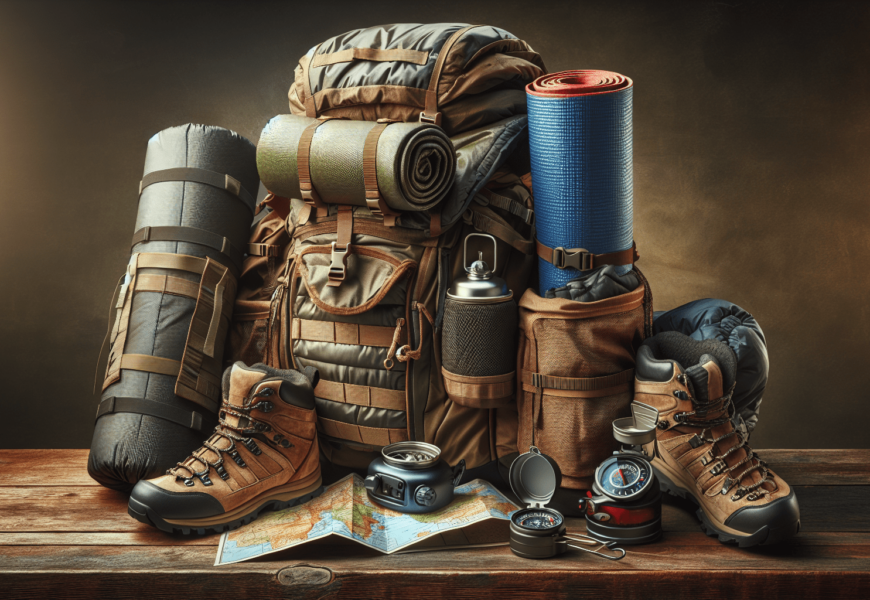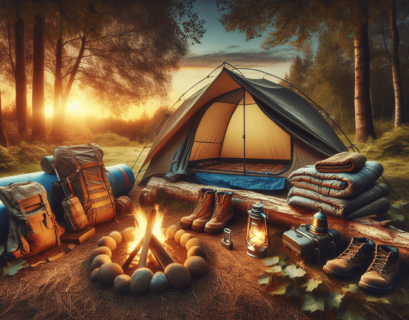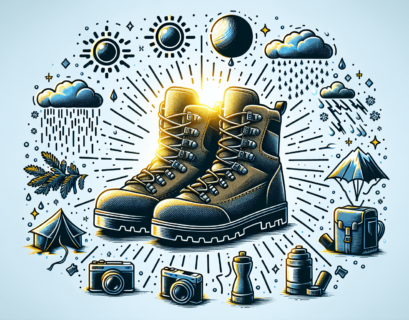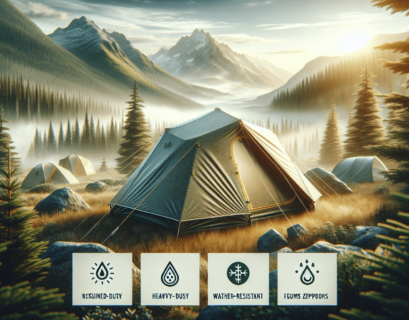Are you ready to embark on the ultimate adventure? Look no further than the “Ultimate Guide to Adventure Camping: Tips for Beginners.” This comprehensive guide is tailored specifically for those new to the world of camping, providing a wealth of expert advice and practical tips to make your camping experience unforgettable. From choosing the perfect campsite to packing essential gear, you’ll have all the information you need to confidently embrace the outdoors. So grab your tent, lace up your hiking boots, and get ready to embark on a journey you’ll never forget.
Understanding Adventure Camping
Adventure camping is a thrilling and dynamic way to connect with nature and push your limits in the great outdoors. Unlike regular camping, adventure camping involves venturing into more rugged and remote locations, where you can challenge yourself and embrace the unknown. It’s a perfect option for those seeking an adrenaline rush and a deeper sense of exploration and self-discovery.
There are several key differences between adventure camping and regular camping. While regular camping typically involves staying at established campgrounds with designated sites, amenities, and easy access to facilities, adventure camping takes you off the beaten path. Adventure camping requires a greater level of self-sufficiency and self-reliance, as well as a willingness to embrace uncertainty and adapt to unforeseen challenges.
Adventure camping encompasses various types, each offering a unique experience. Backpacking camping involves carrying all your essentials, including your tent and supplies, in a backpack and navigating through extensive wilderness areas. Canoe or kayak camping allows you to explore remote waterways, where you camp on islands or along the shore. Rock climbing camping combines the thrill of climbing with overnight stays on remote rock faces. Other types include winter camping, desert camping, and mountaineering camping.
Essential Gear for Adventure Camping
Before venturing into the wild, you need to ensure you have the essential gear to make your adventure camping experience comfortable and safe. Here is a breakdown of the must-have items:
Camping Tent Essentials
A high-quality camping tent is the foundation of a successful adventure camping trip. Look for a tent that is durable, lightweight, and waterproof. Consider the number of people you’ll be camping with and choose a size that provides ample space for everyone. Additionally, invest in a good sleeping mat or pad to provide insulation and cushioning from the ground.
Sleeping Gear
A warm and comfortable sleeping bag is essential for a good night’s sleep while adventure camping. Opt for a sleeping bag designed for the expected weather conditions. Look for a sleeping bag with a temperature rating that matches the lowest temperature you anticipate encountering. Additionally, consider using a camping pillow or improvising with soft clothing to ensure maximum comfort.
Cooking Supplies
To prepare meals while camping, you’ll need cooking supplies such as a camping stove or portable grill, cookware, utensils, and plates. Choose lightweight and durable options. Also, don’t forget to pack food storage containers or bags to keep your meals fresh.
Adventure-Specific Equipment and Tools
The specific type of adventure camping you choose will determine the additional equipment and tools you need. For example, if you plan to go backpacking camping, you’ll need a comfortable and supportive backpack with enough storage capacity. If you’re going rock climbing camping, you’ll need specialized climbing gear like ropes, harnesses, and carabiners. Research the specific requirements for your chosen adventure camping activity to ensure you have all the necessary equipment.
The Role of a Topo Map and Compass
Navigational tools like a topographic map and compass are crucial for adventure camping. These tools allow you to navigate through unfamiliar terrain, determine your location, and plan your route. Familiarize yourself with how to read a topographic map and use a compass before embarking on your adventure camping trip.
Proper Clothing and Footwear for Different Environments
Pack appropriate clothing and footwear suitable for the environment and weather conditions you expect to encounter. Layered clothing is ideal, as it allows you to adjust your apparel based on temperature changes. Opt for moisture-wicking and quick-drying fabrics to stay comfortable in various weather conditions. Don’t forget to pack sturdy and comfortable hiking boots or shoes that provide support and protection for your feet.
Choosing Your Adventure Camping Destination
Choosing the right adventure camping destination is crucial for a successful and enjoyable trip. Consider the following factors before making your decision:
Consider Factors Like Climate and Terrain
Take into account the climate, temperature range, and terrain of your desired camping destination. Research the weather patterns and average seasonal temperatures to ensure you pack appropriate clothing and gear. Additionally, familiarize yourself with the terrain to assess if it matches your skill level and comfort zone.
Understanding the Physical Demand of the Location
Different adventure camping destinations vary in terms of physical demand. Some may involve steep ascents, difficult trails, or challenging water currents. Assess your physical fitness level and choose a destination that aligns with your capabilities. Gradually increase your fitness level through regular exercise and training if needed.
The Importance of Local Wildlife Knowledge
Research the local wildlife species and their behavior in the area you plan to camp. Understand any potential risks associated with encounters with wildlife, such as bears, snakes, or insects. Learn how to prevent conflicts and react appropriately if encounters occur. Leave no food or trash out in the open, and store your food securely to avoid attracting wildlife.
Research the Legalities and Obtain Necessary Permits
Ensure that you familiarize yourself with the rules and regulations of the camping area you choose. Some areas may require permits or have restrictions on camping activities. Contact the appropriate authorities or visit their websites to obtain the necessary permits and stay in compliance with the local regulations.
Preparing for Adventure Camping
Proper preparation is key to a successful adventure camping experience. Consider the following aspects as you prepare for your trip:
Physical Fitness and Conditioning
Adventure camping often involves physical exertion and endurance. Prioritize your physical fitness by engaging in regular exercise and training that mimics the activities you’ll be undertaking on your camping trip. Strengthen your cardiovascular fitness, build muscular endurance, and improve your flexibility. Gradually increase the intensity and duration of your workouts to prepare your body for the demands of adventure camping.
Acquiring Necessary Survival Skills
Developing essential survival skills is vital for adventure camping. Learn how to start and maintain a fire, purify water from natural sources, navigate using a map and compass, and administer basic first aid. Acquiring these skills will help you stay safe and self-sufficient during your camping trip.
Planning Your Route and Alternative Routes
Plan your route carefully and identify alternative routes in case unexpected circumstances arise. Study the topographic map and consider the terrain, water sources, and potential hazards along your chosen route. Communicate your itinerary with a trusted friend or family member and provide them with key details about your trip, including your estimated return date.
Food and Water Planning
Calculate your food and water needs for the duration of your adventure camping trip. Opt for lightweight, nutrient-dense foods that are easy to prepare. Consider options like dehydrated meals, energy bars, and trail mix. Ensure you have enough water or purification methods to stay hydrated. Plan for contingencies and carry extra food and water in case of unforeseen circumstances or delays.
Dealing with Common Injuries
Be prepared to handle common injuries that may occur while adventure camping. Carry a well-stocked first aid kit and familiarize yourself with how to use its contents. Learn basic first aid techniques, such as treating cuts, burns, sprains, and insect bites. Additionally, ensure you have a plan for seeking medical assistance if required.
Setting Up Camp
Setting up camp efficiently and safely is essential for a comfortable and enjoyable adventure camping experience. Here’s what you need to consider:
Choosing the Right Site
Select a campsite that provides suitable shelter, flat ground for your tent, and adequate distance from potential hazards like falling trees or unstable terrain. Look for a location that offers access to water sources, if needed, and a scenic view, if possible. Follow any guidelines or restrictions in the camping area regarding where you can set up your camp.
Setting Up Your Tent
Set up your tent following the manufacturer’s instructions. Choose a sheltered area to minimize exposure to wind, rain, and potential hazards. Ensure that your tent is pitched securely and that the rainfly is properly placed to provide protection from the elements. Familiarize yourself with how to repair minor damage to your tent, should it occur during your camping trip.
Making a Fire Safely
If permitted and necessary, make a fire in a safe and responsible manner. Choose a designated fire pit or create a well-constructed fire ring. Use dead and fallen branches for firewood and never cut live trees or damage vegetation. Ensure you have enough water nearby to extinguish the fire completely before leaving your campsite or going to sleep.
Keeping Your Food and Belongings Secure
Protect your food and belongings from wildlife by storing them in a secure manner. Keep food in airtight containers or bear-proof canisters, elevated from the ground or hung from trees, following the guidelines specific to the camping area. Store other scented items like toiletries or trash in secure containers to minimize the risk of attracting animals.
Adventure Camping Safety
Safety should be a top priority during adventure camping. Consider the following safety measures:
Local Fauna and How to React
Educate yourself about the wildlife species you may encounter during your adventure camping trip. Learn how to react in the presence of potentially dangerous animals like bears or snakes. Carry bear spray or other recommended wildlife deterrents, and know how to use them effectively. Stay alert and make noise while hiking to avoid surprising wildlife in close proximity.
Importance of First Aid Skills
Having basic first aid skills can be crucial in administering immediate care for injuries or medical emergencies. Take a first aid course that covers wilderness or remote areas to ensure you have the necessary knowledge and skills to respond effectively. Refresh your skills periodically to stay up to date with the latest techniques and recommendations.
Emergency Procedures and Contact Numbers
Familiarize yourself with emergency procedures specific to your camping area. Note down important contact numbers, such as park rangers or local emergency services, and keep them readily accessible. Understand how to call for help if needed and follow any specific instructions provided by the camping area authorities in case of an emergency.
Safety of Water Sources
Ensure that any water sources you encounter in the wilderness are safe to drink. Depending on the location, water sources may carry pathogens or contaminants that can cause illness. Use water purification methods like boiling, filtering, or using chemical treatment when in doubt. Carry water purification tablets or a portable water filter to be prepared for any situation.
Avoiding Hypothermia and Heat Stroke
Both hypothermia and heat stroke can pose serious risks during adventure camping. Dress appropriately to regulate your body temperature in cold or hot weather conditions. Layer your clothing to stay warm in colder temperatures, and stay hydrated and seek shade in hot and sunny conditions. Monitor your body and be aware of the symptoms of these conditions to take prompt action if necessary.
Living Sustainably in the Outdoors
Part of being an adventure camper is embracing a sustainable mindset and treading lightly on the environment. Emphasize these principles during your camping trips:
Leave No Trace Principles
Adhere to the Leave No Trace principles, which advocate for minimizing your impact on the environment. Pack out all your trash and dispose of it properly when you reach designated waste bins. Avoid damaging vegetation, disturbing wildlife, or leaving any permanent marks or structures in the camping area.
Being Wildlife Aware
Respect and observe wildlife from a safe distance. Avoid approaching or feeding animals, as this can disrupt their natural behavior and create unhealthy dependencies. Never attempt to touch or interact with wildlife, and keep food securely stored to prevent conflicts or unwanted encounters.
Efficient Use of Camping Resources
Practice efficient use of camping resources, such as water and firewood. Minimize your water consumption by taking quick showers or sponge baths, and avoid leaving taps running unnecessarily. Use dead and fallen branches for firewood instead of cutting live trees, and ensure you gather only what you need, sparingly, to conserve resources.
Pack In, Pack Out Rule
Follow the pack in, pack out rule, which means that whatever you bring into the camping area should leave with you. Dispose of all waste properly at designated waste bins outside the camping area. Leave the campsite in its original condition, erasing any trace of your presence.
Advantages and Disadvantages of Adventure Camping
Adventure camping offers numerous advantages but also comes with its share of disadvantages. Consider these factors before embarking on an adventure camping trip:
Physical and Mental Benefits
Adventure camping provides an excellent opportunity to improve your physical fitness, develop mental resilience, and increase self-confidence. The physical demands of adventure camping help build strength, endurance, and flexibility. The mental challenges and problem-solving that come with navigating unfamiliar terrain and adapting to changing situations foster self-reliance and an increased sense of accomplishment.
Boost Survival Skills
Adventure camping allows you to put your survival skills to the test in real-world scenarios. It provides an opportunity to apply the knowledge you’ve acquired about first aid, navigation, fire starting, and shelter building. This hands-on experience hones your skills and prepares you for future outdoor adventures.
Challenging Weather Conditions
Adventure camping often takes you to remote and unpredictable environments, where weather conditions can change rapidly and become challenging. You may encounter heavy rain, strong winds, extreme temperatures, or unexpected storms. While these conditions can add excitement to your trip, they can also pose risks and make certain activities more difficult or unsafe.
Isolation Risks and Challenges
Adventure camping often involves venturing into remote areas, far from civilization and emergency services. While the isolation can be a big part of the appeal, it also means you’ll have limited access to medical assistance or immediate help in case of emergencies. It’s essential to be well-prepared, self-sufficient, and able to handle various situations that may arise.
Adventure Camping Etiquettes
Respecting the camping environment and others around you is crucial for a positive adventure camping experience. Follow these etiquettes to ensure a harmonious and enjoyable trip:
Respecting Other Campers
Be considerate of fellow campers by keeping noise levels down, especially during quiet hours. Avoid playing music loudly or engaging in activities that may disrupt others’ peace. Respect their privacy and personal space, and keep a reasonable distance between your campsite and theirs.
Keeping Noise Levels Down
Maintain a peaceful and quiet atmosphere in the camping area. Avoid excessive noise that may disturb wildlife or other campers. Keep conversations at a moderate level, use headphones when listening to music or watching videos, and choose quieter activities that don’t generate excessive noise.
Caring for the Natural Environment
Leave the camping area as you found it, or even better than you found it. Avoid damaging vegetation, cutting live trees, or damaging natural rock formations. Dispose of waste properly in designated bins or pack it out with you. Minimize your impact on the surroundings and respect the delicate balance of the natural environment.
Adventure Camping FAQs for Beginners
Here are answers to some common questions that beginners often have about adventure camping:
What Should I Pack?
Pack essential gear like a camping tent, sleeping bag, cooking supplies, adventure-specific equipment, clothing suitable for the weather and terrain, and other necessary items such as a topographic map, compass, and first aid kit. Consider the specifics of your adventure camping activity and pack accordingly.
What’s the Best Season for Adventure Camping?
The best season for adventure camping varies depending on the location and the type of adventure camping you plan to undertake. Research the climate and weather patterns for your chosen destination to determine the ideal season. Consider factors like temperature, precipitation, and any extreme weather conditions that may affect your safety and comfort.
How to Handle Emergency Situations?
In case of an emergency, assess the situation calmly and take appropriate action. If possible, contact emergency services or seek help from other campers nearby. Having basic first aid skills and knowledge of emergency procedures can be invaluable in responding effectively to emergencies. Always communicate your itinerary and inform a trusted person about your plans, so they can take action if you don’t return as expected.
How to Prepare for Unpredictable Weather?
Prepare for unpredictable weather by packing clothing layers suitable for various conditions. Pack a waterproof and windproof outer layer to protect against rain or sudden temperature drops. Stay informed about weather forecasts and make adjustments to your plans if necessary. Carry necessary items like a lightweight tarp for shelter, extra clothing, and additional food and water in case of unexpected weather-related challenges.
How to Find Clean Water Sources?
Finding clean water sources in the wilderness is crucial for staying hydrated. Research the camping area to identify possible water sources, such as rivers, lakes, or streams. Carry water purification methods like water filters or purification tablets to treat the water before consumption. Learn how to identify natural indicators of clean water, such as fast-moving water or sources located away from human activity.
With these comprehensive tips and guidelines, you are now equipped to embark on an adventure camping trip with confidence. Remember to prioritize safety, respect the environment, and enjoy the thrilling experiences and stunning landscapes that adventure camping offers. Happy camping!







